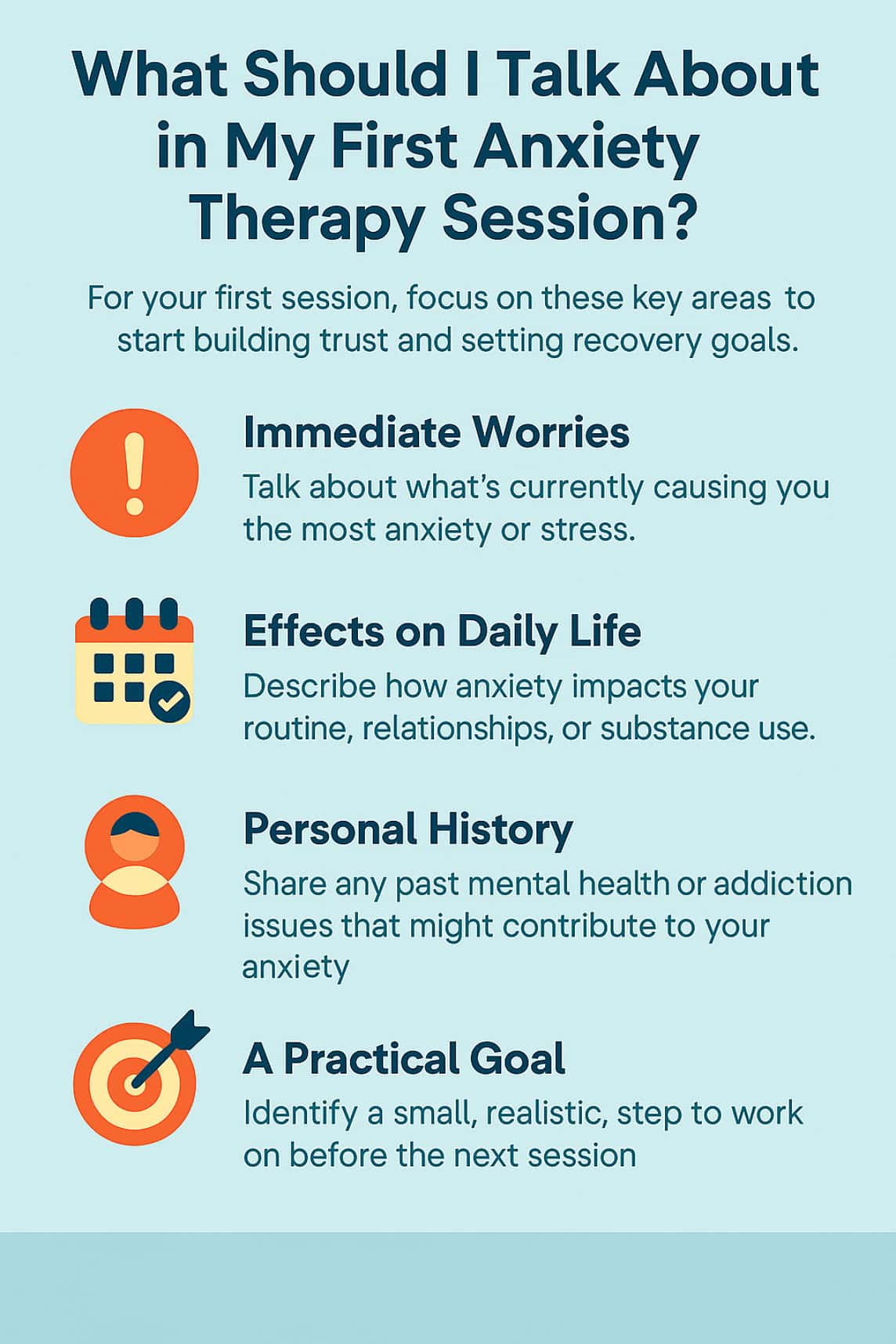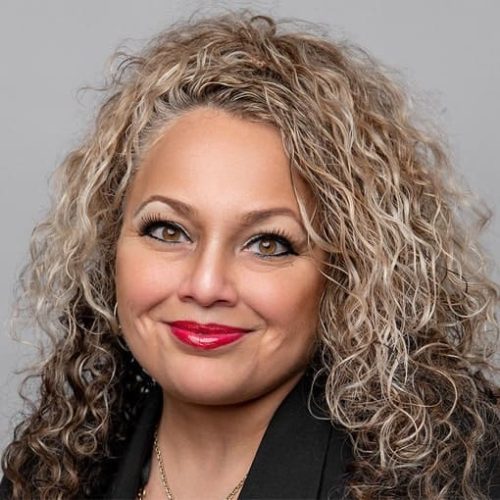
Key Takeaways for the First Anxiety Therapy Session.
- Share your immediate worries, especially how anxiety shows up in your daily life and work.
- Talk about any substance use or coping habits that relate to your anxiety.
- Provide a brief mental-health history if possible, including past treatments or family background.
- Set one practical goal to work on between now and your next session.
- Come prepared with notes, arrive early, and be honest, your therapist is there to help, not judge.
Starting this way helps build trust, set a clear treatment plan, and puts you on the path toward real relief.
👉 Ready to take the next step? learn more about anxiety therapy at AERCS and book your free 15-minute phone consultation.

When you sit down for your first anxiety therapy session, lead with your most pressing worries, describe how those feelings show up in your body and daily life, mention any substance use you rely on to cope, and finish by naming one concrete goal for the next visit. Sharing this focused snapshot sets a clear agenda, lets your clinician see exactly where anxiety hits hardest, and gives the two of you an immediate plan for relief, all within the first few minutes of your first anxiety therapy session.
Why Your First Anxiety Therapy Session Matters.
- In Ontario, mood and anxiety disorders affect roughly one in ten adults every year (CMHA National).
- Across Canada, one in five people will experience a mental-health problem in any given year (CAMH).
These numbers show you are not alone and tell us that the first meeting is your chance to start reversing the trend. A well-structured opening conversation builds trust quickly and helps the therapist customise tools that fit your lifestyle in Orangeville, Toronto, or anywhere in the GTA.
Bring Your Immediate Worries to the Table.
Link Anxiety to Daily Life and Work.
Describe the specific moments when anxiety spikes, such as morning commutes on the 401, presentations at work, or going to social gatherings. Concrete examples help your therapist see patterns and tailor coping strategies.
Mention Any Substance Use Honestly.
If you use alcohol, cannabis, or prescription medications to take the edge off, say so upfront. Therapists handle this information without judgment, and it directly helps the plan they suggest for managing triggers safely.
Share a Snapshot of Your Mental-Health Journey.
- Past diagnoses and treatments: Share previous counselling, medications, or hospital stays.
- Family history: Note any relatives with anxiety or addiction.
- Current supports: List doctors, support groups, or trusted friends.
Keeping the history brief (about five minutes) leaves more time for skill-building.
Set One Practical Goal Before You Leave.
Choose a small, measurable target you can revisit in session two, such as:
- Practise diaphragmatic breathing three times per day,
- Keep a nightly worry log,
- Reduce caffeine by one cup each morning.
A single goal turns insight into action and provides an early win.
Preparation Tips to Walk In Calm and Ready.
- Jot down symptoms: Note physical sensations like racing heart or sweaty palms.
- Rank your top three worries from most to least intense.
- Arrive ten minutes early to acclimate to the office or log in calmly if online.
- Bring water and tissues in case strong emotions surface.
- Plan a post-session buffer (short walk, quiet music) to process what you discussed.
What Your Therapist Will Ask and Why.
Expect questions about thoughts, feelings, behaviours, and any coping habits. They might ask:
- “On a scale of 1–10, how high is your anxiety at its worst?”
- “When did you first notice these feelings?”
- “What situations do you avoid?”
These prompts guide assessment, set benchmarks, and ensure the conversation addresses both anxiety and its triggers.
Tracking Progress from Session One Onward.
- Weekly self-ratings: Score anxiety and substance cravings.
- Skill usage log: Note when and how you practised breathing, journalling, or exposure steps.
- Session reviews: Spend the last five minutes summarising wins and hurdles.
Documenting change keeps momentum high and alerts you and your therapist to celebrate gains or adjust strategies early.
Next Steps.
Your first anxiety therapy session works best when you speak openly about immediate worries, link anxiety to any substance use, offer a concise personal history, and leave with one actionable goal. This structure builds trust, targets the right triggers, and sets you on a measurable path to calmer days.
Ready to put these ideas into practice? Click here to explore Anxiety Therapy and how to book your free 15-minute phone consultation. Let’s map out the next steps together.
What should I include in my symptom list for the first anxiety therapy session?
Write physical sensations, triggering thoughts, and behaviour patterns to help your therapist sees the a full picture.
Is it bad to admit substance use in my first anxiety therapy session?
No, transparent discussion lets your clinician tailor strategies that address both anxiety and coping habits.
How long will the first anxiety therapy session take?
A typical first anxiety therapy session lasts 50 to 60 minutes, giving enough time for assessment and goal setting.
Do I need medical records at my first anxiety therapy session?
Bringing past reports is helpful but not essential; summarising key points verbally is often enough.
Can I ask about confidentiality during my first anxiety therapy session?
Absolutely, understanding privacy policies in your first anxiety therapy session builds trust and helps with peace of mind.
Do You Need Anxiety Therapy?
Take this quick self-assessment to see if anxiety therapy could help you manage symptoms.Note: This questionnaire is educational only and does not replace a clinical assessment. If you wish to obtain professional guidance, please follow up with a licensed mental health professional.

